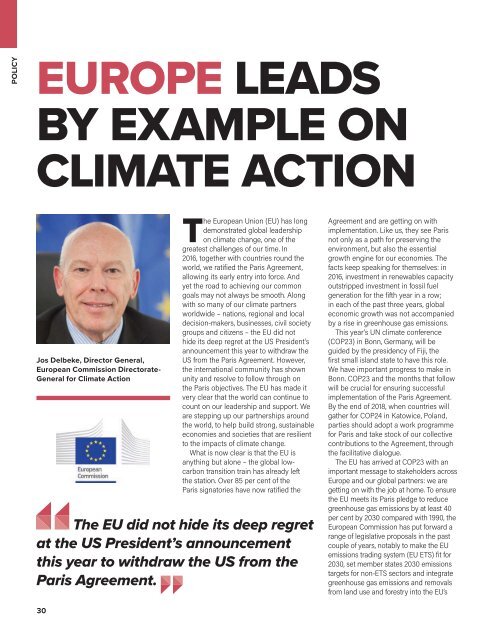Climate Action 2017-2018
Create successful ePaper yourself
Turn your PDF publications into a flip-book with our unique Google optimized e-Paper software.
POLICY<br />
EUROPE LEADS<br />
BY EXAMPLE ON<br />
CLIMATE ACTION<br />
Jos Delbeke, Director General,<br />
European Commission Directorate-<br />
General for <strong>Climate</strong> <strong>Action</strong><br />
The European Union (EU) has long<br />
demonstrated global leadership<br />
on climate change, one of the<br />
greatest challenges of our time. In<br />
2016, together with countries round the<br />
world, we ratified the Paris Agreement,<br />
allowing its early entry into force. And<br />
yet the road to achieving our common<br />
goals may not always be smooth. Along<br />
with so many of our climate partners<br />
worldwide – nations, regional and local<br />
decision-makers, businesses, civil society<br />
groups and citizens – the EU did not<br />
hide its deep regret at the US President’s<br />
announcement this year to withdraw the<br />
US from the Paris Agreement. However,<br />
the international community has shown<br />
unity and resolve to follow through on<br />
the Paris objectives. The EU has made it<br />
very clear that the world can continue to<br />
count on our leadership and support. We<br />
are stepping up our partnerships around<br />
the world, to help build strong, sustainable<br />
economies and societies that are resilient<br />
to the impacts of climate change.<br />
What is now clear is that the EU is<br />
anything but alone – the global lowcarbon<br />
transition train has already left<br />
the station. Over 85 per cent of the<br />
Paris signatories have now ratified the<br />
The EU did not hide its deep regret<br />
at the US President’s announcement<br />
this year to withdraw the US from the<br />
Paris Agreement.<br />
Agreement and are getting on with<br />
implementation. Like us, they see Paris<br />
not only as a path for preserving the<br />
environment, but also the essential<br />
growth engine for our economies. The<br />
facts keep speaking for themselves: in<br />
2016, investment in renewables capacity<br />
outstripped investment in fossil fuel<br />
generation for the fifth year in a row;<br />
in each of the past three years, global<br />
economic growth was not accompanied<br />
by a rise in greenhouse gas emissions.<br />
This year’s UN climate conference<br />
(COP23) in Bonn, Germany, will be<br />
guided by the presidency of Fiji, the<br />
first small island state to have this role.<br />
We have important progress to make in<br />
Bonn. COP23 and the months that follow<br />
will be crucial for ensuring successful<br />
implementation of the Paris Agreement.<br />
By the end of <strong>2018</strong>, when countries will<br />
gather for COP24 in Katowice, Poland,<br />
parties should adopt a work programme<br />
for Paris and take stock of our collective<br />
contributions to the Agreement, through<br />
the facilitative dialogue.<br />
The EU has arrived at COP23 with an<br />
important message to stakeholders across<br />
Europe and our global partners: we are<br />
getting on with the job at home. To ensure<br />
the EU meets its Paris pledge to reduce<br />
greenhouse gas emissions by at least 40<br />
per cent by 2030 compared with 1990, the<br />
European Commission has put forward a<br />
range of legislative proposals in the past<br />
couple of years, notably to make the EU<br />
emissions trading system (EU ETS) fit for<br />
2030, set member states 2030 emissions<br />
targets for non-ETS sectors and integrate<br />
greenhouse gas emissions and removals<br />
from land use and forestry into the EU’s<br />
30












